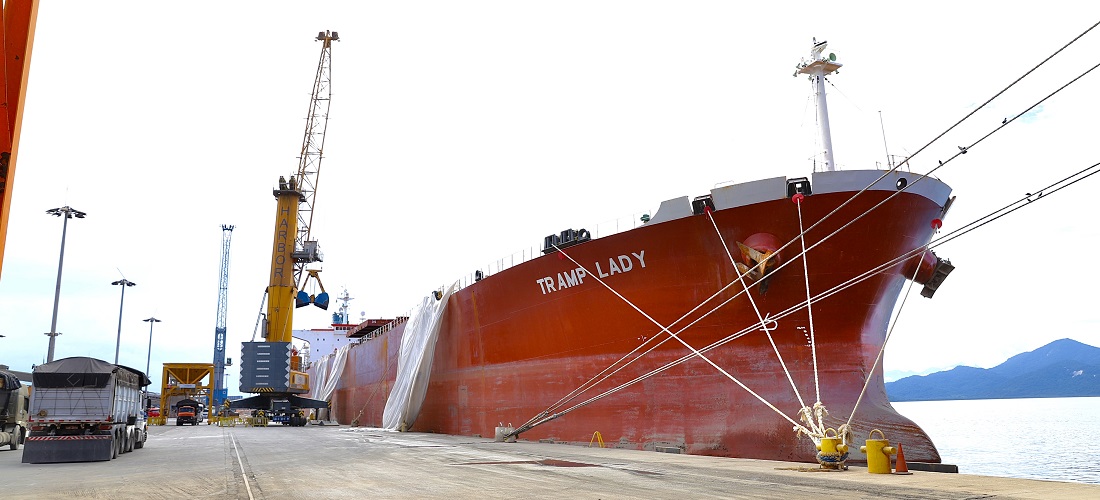
Port of Paranaguá prepares to receive 225-meter vessels
Feb, 01, 2021 Posted by Ruth HollardWeek 202105
The Port of Paranaguá carried out a special maneuver this weekend to be able to provide a new service, especially for solid bulk imports. 225-meter vessels loaded with fertilizers can now dock at the commercial dock, permitting them to return abroad carrying export bulk.
The test was carried out with the vessel Tramp Lady, finalizing the unloading of 41,748 tons of fertilizer (ammonium sulfate) in berth 211. For the time being, the test was not performed using a fully loaded vessel, but all the equipment and structures were tested. The final implementation depends on the approval of the new draft.
“The idea is to allow 225-meter vessels – which are the same ships that dock in the Export Corridor, Panamax standard – to occasionally deliver fertilizer and leave with soybeans”, explains Luiz Teixeira da Silva Junior, Director of Port Operations.
According to Teixeira, the Tramp Lady is the largest ship to date that has docked at the commercial dock to deliver fertilizer. The vessel has seven holds, without an onboard crane. Generally, the ships that bring bulk to Paraná ports measure between 190 and 200 meters, have only five holds and onboard cranes to assist in the unloading operation.
Despite being the largest, it did not arrive with a full load. “It arrived carrying 41,000 tons. It is capable of shipping 60,000 to 65,000 tons like the ships in the corridor that have the same draft, 12.5 meters. But in berths 209 and 211 we do not have a 12.5-meter draft yet. We are studying the approval of a 12.5-meter draft for these berths ”, the director explained.
Operation – According to the Operations and Logistics Manager at Harbour, the operator responsible for the Tramp Lady, this mooring is a paradigm break. “It is important to highlight the effort that Portos do Paraná made with the Operations personnel to dock this ship since the berth is for 200 meters. There was a lot of planning and engineering work to dock this ship, which, in fact, is a paradigm break and will trigger new opportunities and new operational designs”, he points out.
According to him, the vessel came from China and flies the Malta flag.
Preparation – All dredging work and bathymetry studies have already been done. It is expected that the documentation will be sent to the Navy for approval in February. Currently, the operational draft is 10.8 meters.
According to Teixeira, once the 12.5-meter draft is approved, Paranaguá gains a new differential. “The ships will be able to come with a large amount of fertilizer, in a single vessel equivalent to two of those that normally come, and with lower freight costs. The importer would gain in freight and would still be able to qualify for the loading of solid bulk”, he highlights.
Typically, berths specialized in fertilizers can receive vessels from between 190 to 200 meters. “We have the equipment and the cranes on wheels that can easily operate on a ship of this size. We are doing a test to see its length, or the LOA, because the draft has not yet been approved at 12.5 meters. The current draft is 10.8 meters so we would go to 12.5 meters, which is the same draft as the Corridor ”, he stated.
The director also highlights the reduction in costs for operators. “When you have two ships, you can spend eight hours at berthing and unberthing. With the larger draft, you would just have 1 ship to handle, in half the time, and a discharge of more than 60,000 tons. You would save time too, and time generates costs”, concludes Teixeira.
Portos do Paraná Fertilizer Imports (HS 31) | Jan 2017 – Dec 2020 | WTMT
Source: DataLiner (to request a DataLiner demo, click here)
-
Other Logistics
Nov, 28, 2019
0
Early renewal of the Malha Paulista concession is guaranteed by TCU
-
Shipping
Apr, 03, 2024
0
Eight missing after Chinese fishing boat collides with Panama container ship
-
Economy
Aug, 28, 2024
0
Argentina’s Milei Lowers Key Import Tariff To Cool Inflation
-
Ports and Terminals
May, 11, 2022
0
The privatization of the Port of Santos dominates Brazil’s roadshow in the US



